You spend 295,200 minutes in high school. That’s 4,920 hours. 720 days. 4 years.
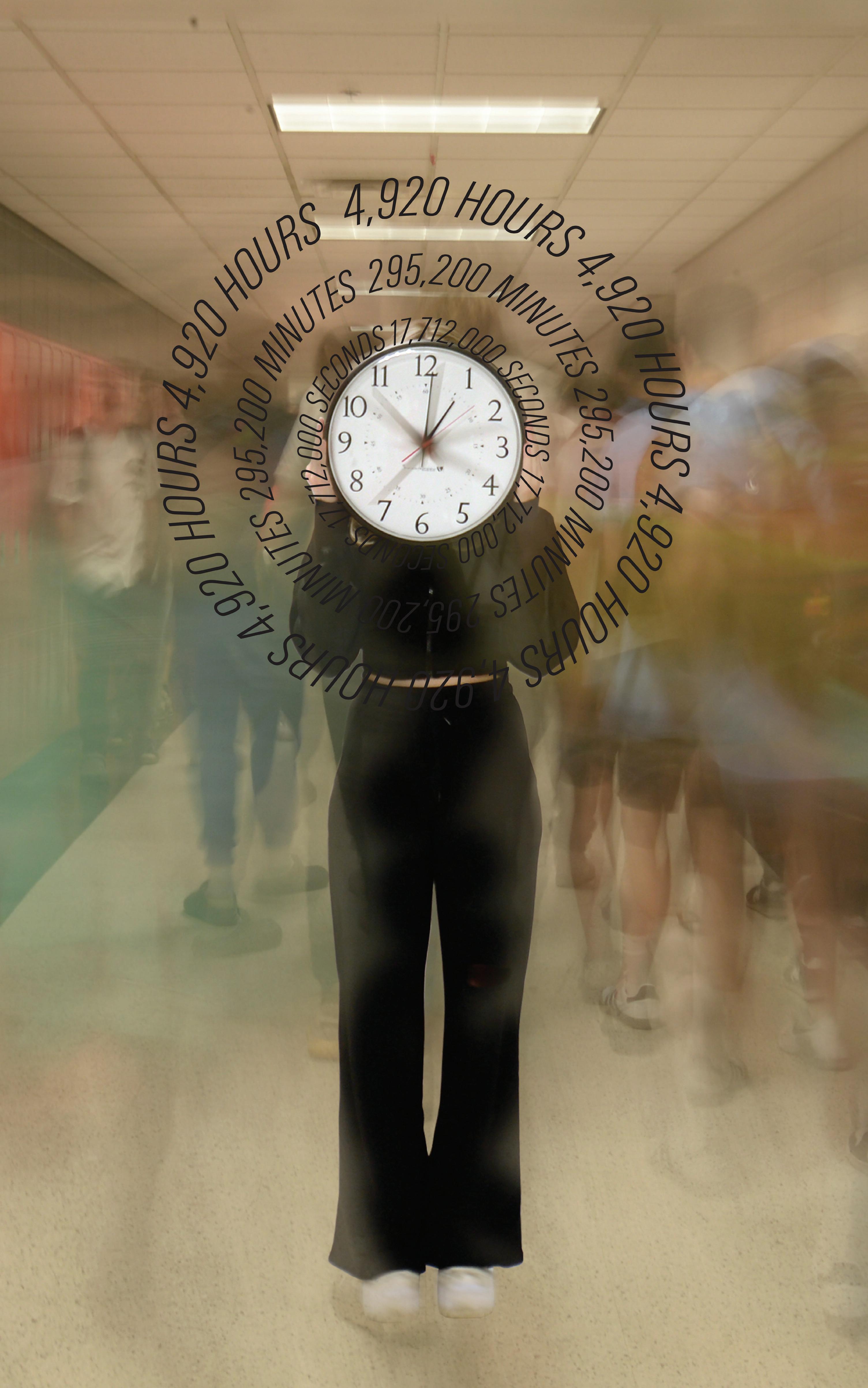
Though we often think of the stereotypical high school student going through classes as time ticks, our unique experiences and moments in time reflect that education should not be passive. Learning doesn't happen by staring at a computer screen or mindlessly filling in the blanks of a worksheet— it happens in what we do every day: education is not simply going through motions.
read this special issue of Crier

munster high school april 21, 2023 volume 59 issue 9
munster high school 8808 columbia ave. munster, indiana 46321 http://mhsnews.net
photo by josephine mittelberger
Why Crier published this special issue
Our take:
Education is not the act of going through motions, and it is Crier’s job to feature different experiences
410 minutes in one school day times the 720 days we are required to be in school. That’s 295,200 minutes. When we decided to create this special issue, we knew we wanted to highlight specific student narratives—the moments in these hundreds of thousands of minutes that cause us to pause, and think about what we’ve learned.
We’ve seen efforts at a local, state and national level when it comes to anything and everything impacting our education: whether that’s the 100+ bills in this legislative session or a shift in MHS’ direction with
Professional Learning Communities. All these forms of policy have an effect on our education and the people we become in these various moments in time. But through all these impacts, Crier retains one goal: education should encourage critical thinking. Learning is not just memorization, but application—the shift towards PLCs reflects this, but we also published this issue to reflect on student involvement in education. While it is impossible to cater to each individual student, student ownership of learning cannot exist without that
Failing Behind
“How do you allow yourself to fail?”—a question I constantly receive. Usually throughout the quarter, D’s, C’s, and F’s plague my PowerSchool. For the longest time, I shamed myself for my grades. For years I struggled with school — little things like paying attention and taking notes have always been hard for me. I would drift off into my own world, and class would be over by the time I found my way back.
constant cycle of communication. In the same vein, we cannot continue to put pressure on the teachers who advise us without asking about their needs.
Though high school, in the end, is just four years of a student’s life, the lessons we learn in our time here are supposed to change our lives; the point of civic education is that it changes the way in which we think. As we go out to vote, we should be able to use the critical thinking skills we learned in schools—beyond regurgitating information and memorizing bits of information.
What is a moment in high school that changed the trajectory of your life? questions we asked students and staff
Project Isolation
After months worth of what I once glorified as an extended summer break, I was soon humbled with a less-than-warm greeting once I returned for my eighth grade school year: an obnoxiously large plastic tri-fold, awaiting my return atop of my homeroom’s desk. As if labored breathing beneath an itchy linen mask wasn’t enough to set me over the top, students were required to put these up during every period.
I spared no effort to keep the rubbish intact, carelessly jamming it into my bag and creasing the corners.
The rest of the year carried on in blackand-white, stripped of all it’s color; what once were lively shrieking tables turned into seas worth of plastic barricades and blue masks. What once were late-night calls stretching until sunrise turned into

brief texts asking about the homework. And what once was a teen was then a student, only serving to do my work and get good grades.
Despite my resentment, I spent more time with that damned trifold than I did anyone else during the pandemic. And period after period, day after day, that blur of the plastic barricade served as a reminder of
Crier, Munster High School’s official student newspaper, may be reached via mail at 8808 Columbia Ave, Munster, IN 46321 or at (219) 836-3200, ext. 3443. Crier is published through the Advanced Student Media: Newspaper classes and extra-curricular involvement. Crier’s official website is mhsnews.net.
•The newspaper serves as a public forum and two-way communication for the school and community. •Published material will stress objective reporting except on the opinion page. All published material will stress accuracy, integrity, honesty, responsibility, objectivity, fairness and independence. Corrections, when necessary, will be published on page 2.

•Opinions expressed in the newspaper do not necessarily reflect those of the School Town of Munster, faculty or administration. All content is decided and produced solely by Crier staff.
•Letters to the editor and reader suggestions are welcomed.

the opportunities slipping by infront of me. The world kept on spinning, and I felt like I was stuck in place.
It’s been two years since the pandemic first took effect at our schools, but no vaccine would have cured the everlasting impression covid afflicted onto me. I still dig through the bottom of my bag to avoid asking the people around me for an eraser.
I still scream questions of my teacher’s lectures in my head, too afraid to speak up and ask out of place. I still melt hours away after school in the solace of my bed. And I still awkwardly pass conversations with “im-so-tired”s and “what-period-do-you-have-next”s.

Although I might not have to lug around that awkwardly large trifold from class-toclass anymore, I still feel like that same 14 year-old girl looking through a window into what could’ve been mine.

All letters must be signed and should be emailed to the editor (reenaalsakaji@gmail.com). Letters must not contain personal attacks against an individual. Editors reserve the right to edit for length, clarity, and grammatical errors.

•Anonymous sources will be used if and only if the content matter is of high importance and if identification could bring any possible harm towards the individual or others.
our staff
Editor-in-Chief Reena Alsakaji
Design Chief Josephine Mittelberger
Story Editor Lauren Hoogeveen
Realizing that I learned differently from the other students came as no surprise. In the seventh grade, I was diagnosed with severe ADHD, and although putting a name to the problem was reassuring, it didn’t help solve the problem. I found myself year after year experimenting through trial and error to find out what else could work for me. Working with people and without, working at home and going out. However, even after finally understanding myself and how I worked, I still could not manage to get my grades up. I would complete every math assignment, and I would engage in class discussions— yet I would still end up bombing the test. I was getting bad grades anyways so I found no point in stressing over them. Some days I wouldn’t bother to show up to school, other days I would sit in class and refuse to even try.
After years of hating myself for my grades, and defining my self-worth based on them, I found that all I could do was try my best. I know that I’m smart, and although my grades are important, they do not represent me, or my intelligence.
read more staff narratives at mhsnews.net
“I listened to what my mom had told me and stopped overthinking, took a deep breath, and made my mental health a priority.”
lexi villalobos/ photographer
“I’ve spent 1,922 hours after school for Crier alone – including one night during the peak of the budget crisis (and 50 people were losing their jobs because of a lack of funding) when we submitted the paper at 2 a.m.”
ms. sarah-anne lanman / adviser
“Education is not one-size-fits-all, and I am starting to finally understand that.”
lauren hoogeveen / story editor
Photography Trainer Marianna Young
Page Editors Seamus Keegan, Dorothy Lakshmanamurthy, Emily Dywan
Photographers Zoe Clark, Ethan Pischner, Marianna Young, Connor McDonald, Josephine Zangrilli, Lexi Villalobos
Business Manager Josephine Mittelberger
Cartoonist Damien Salahieh
Adviser Ms. Sarah-Anne Lanman
opinion. friday, april 21, 2023 02
illustration by damien salahieh
159,490 minutes remaining
159,490 minutes remaining
photo by josephine mittelberger
photo by josephine zangrilli
Referendum funding
68 teachers / 149 staff
Class size managing
Without those 68 teachers and 149 staff, class sizes increase and the quality of education decreases.
Clubs, electives and sports
Some clubs, electives, and sports won’t be able to continue without the referendum passing.
Other staffing
Losing referendum funds would mean losing two nurses, ten custodial and maintaince staff and other support staff.
Future of Munster schools on the line
Town votes on referendum May 2 to fund Munster schools
On May 2, voters will take to the polls and have the opportunity to vote and possibly renew a referendum that has been in effect in the School Town of Munster since 2017. Munster has recieved funding since 2013, and although the rate rose in 2017, it will not increase how much taxpayers pay if it passes again.
A referendum is an additional way for the schools to receive funding through property tax. The district is asking to charge 41.96 cents per $100 of the 2023 assessed home value until 2031.
Munster’s Political Action Committee has been going door to door in order
to promote the vote in May. They talk to residents about the referendum and its benefits. Dr. Ingrid Schwarz-Wolf, school board vice president, says the most common question they get is about where the money is going.
“People say, ‘Now you’ve gotten all that money since 2017? What do you do with it?’ Well, we spent it, of course. We hired extra teachers on it,” Dr. Schwarz-Wolf said. “And there are certain things you have to use the referendum money for, you can’t just spend it on anything.”

The referendum helps to fund teacher salaries, extracurricular activities and sports, construction projects and insurance expenses.
Dr. Bret Heller, superintendent of Munster schools, says that without the referendum funding, serious cuts will have to be made. The referendum pays for 68 teachers and 149 full-time staff spread across five Munster schools. Without those teachers and staff, class sizes would increase dramatically, and the quality of education Munster is known for would decrease. Accord-

Principal Nolan releases proposed schedule for the next school year
port, see a teacher for help, have a club meeting or have a counselor meeting.

ing to Dr. Heller, when funding was cut in 2009, schools had to cut sports teams, elective classes and staff and the buildings were not taken care of as well.
In 2009, Indiana changed how they fund schools from purely property tax to an economy-dependent state funding system. This new formula placed Munster funding in the bottom 10% of the state. Despite the money the referendum brings, Munster schools are some of the lowest funded.
“We’re still in the bottom 10 out of 372 schools in our state, some of which are virtual schools,” Dr. Ingrid SchwarzWolf said. “Luckily, we’re in a community that supports giving more money to our schools, because they know we perform well.”
In 2017, in addition to increasing the tax rate, the Town of Munster passed an additional capital projects referendum to help fund the new facilities you see around the school now. Both referendums passed with a 68% vote.
BACKTALK

what can be done to improve the education system?
“Not block scheduling. Anything but block scheduling.”
lydia schmucker / junior
what is the most valuable part of education?
“Making sure kids feel accepted and safe in their school’s safety, and comfort.”
ian cabiness / freshman what is the most valuable part of education?
“It helps create a pathway for a good future.”
ava stevens / freshman
what can be done to improve the education system?
“Longer passing periods for time to think about things like using your locker.” isaac ramirez / senior
How to read the new schedule
Below is part of proposed schedule for the next school year. Block scheduling will happen two days a week.
Hoping to have next year’s bell schedule finalized by May, Principal Morgan Nolan sent out a proposal for next year’s schedule to teachers and staff.
A proposed school week for next year would contain three different schedules. This schedule would be a modified block with a traditional schedule—meaning you’d see all your classes—three days a week and block schedule for two days a week where classes would be longer.
Monday, Tuesday and Friday would follow the traditional 7-period schedule from this school year. Wednesday would be A block, and Thursday would be B block. On the B block day, there is a tutorial period that will serve as a resource time to allowing students to get extra sup-
“The longer block days will allow for students and teachers to engage more deeply in learning,” Mr. Nolan said. “Then the traditional days will allow students to catch up and meet with every one of their teachers. There is no perfect schedule, but I think this blend may help find a happy median for all parties involved.”
Mrs. Maria DeRosa-Bellachen, Spanish teacher, likes the daily interactions with all of her classes each day and prefers a traditional schedule. She is concerned that she will be unable to cover all the material needed in an academic year with block days.
“I would have to redesign my lesson plans,” Mrs. Bellachen said. “More time does not equate to teaching more information in a class period.”
A block happens on Wednesdays, while B block happens on Thursdays*
In the event of a shortened week, A block and B block may shift accordingly
Lunch is split based on fifth hour for A block and fourth hour for B block
Tutorial is similar to a study hall or to Mustang Resource Time. Any important information will be given to students during this time
Thursdays will have late start at 8:20 a.m.
Teachers spend one hour, instead of the current 40 minutes, at Professional development meetings
-1:08 p.m.
Lunch A 10:59 a.m. -11:29 a.m.
Lunch B 11:46-12:16 p.m.
Lunch C 12:38 p.m.-1:08 p.m.
6. 01:15 p.m. -2:50 p.m.
The other three days of the week-- Monday, Tuesday and Friday-- will follow the traditional, 7 period schedule we have in place this year.
news. friday, april 21, 2023 03
“There’s certain things you have to use the referendum money for, you can’t just spend it on anything.”
SPEAKING STATISTICS presenting about the School Town of Munster referendum to the publications staff, Dr. Bret Heller, superintendent of schools, explains what school funding the referendum contributes to. On May 2, Munster voters will vote on the continuation of the referendum currently in place. (photo by zoe clark)
The referendum pays 68 teachers and the 149 full-time staff.
Block
A
B Block
PLC 7:15 a.m. - 7:55 a.m. 1. 8:00 a.m. - 9:29 a.m. 3: 9:36 a.m. - 11:06 a.m. 5. 11:13 a.m. -1:13 p.m. Lunch A 11:13 a.m. -11:43 a.m. Lunch B 11:58 a.m.-12:28 p.m. Lunch C 12:43 p.m.-1:13 p.m. 7. 01:20 p.m. -2:50 p.m. PD 7:15 a.m. - 8:15 a.m. 2. 8:20 a.m. - 9:55 a.m. TUTORIAL: 10:02 a.m. - 10:52 a.m. 4. 10:59 a.m.
Dr. Ingrid Schwarz-Wolf
Rewinding time
Insight into the culture changes at MHS in the past five decades
Fifty years ago...
Until Title IX was passed in 1972, girls were restricted to participating in the drill team, cheer team, and the majorettes (right).

Starting in the 1973 school year, the Girls’ Athletic Association was established which included volleyball, bowling, basketball, swimming, gymnastics, track, tennis and golf. Before this, girls participated in the Girls’ Timing Organization, which helped the boys’ sports. Only seven years since the school’s opening in 1965, students were still adjusting to the new environment, including ongoing construction to the building itself.
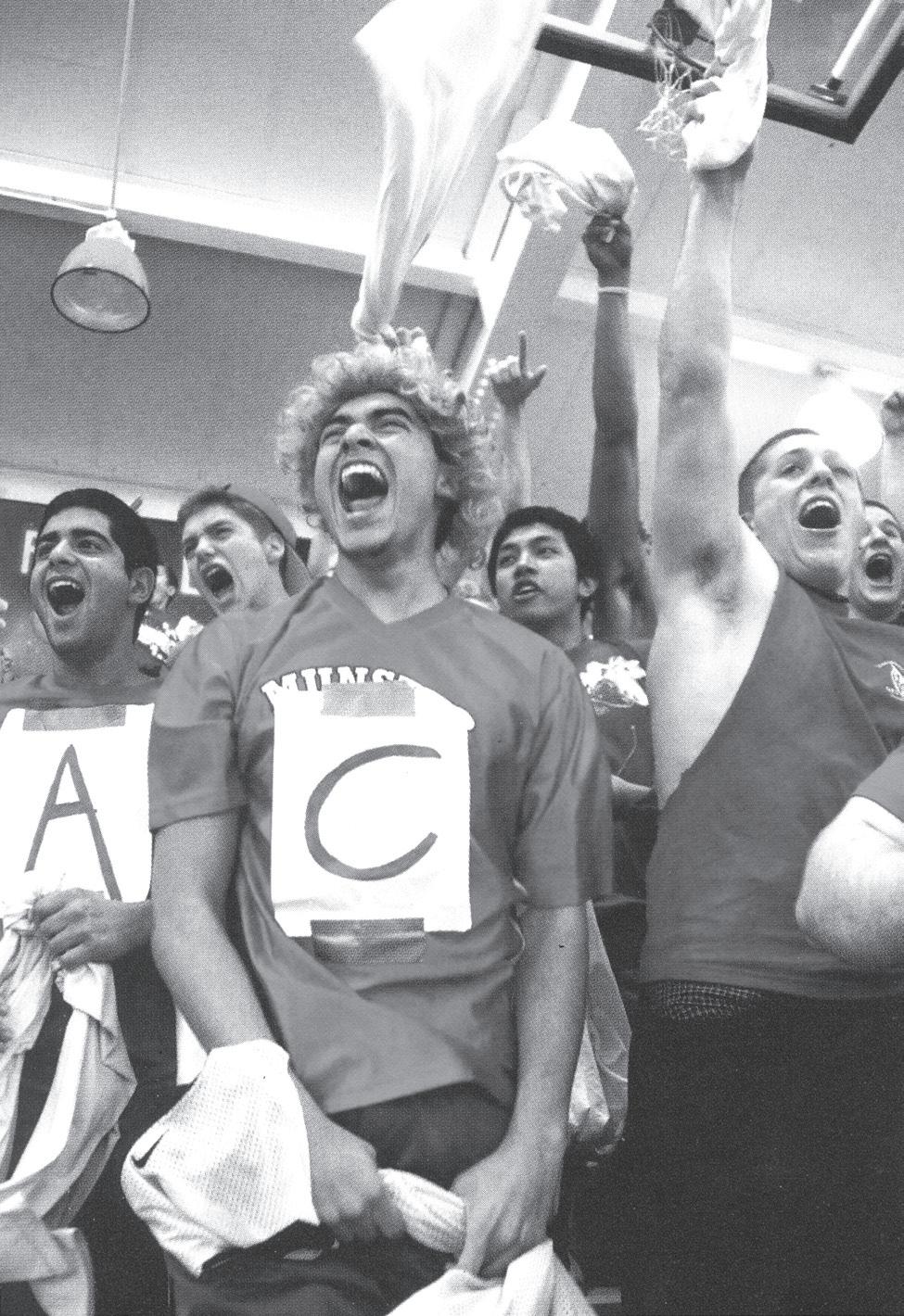
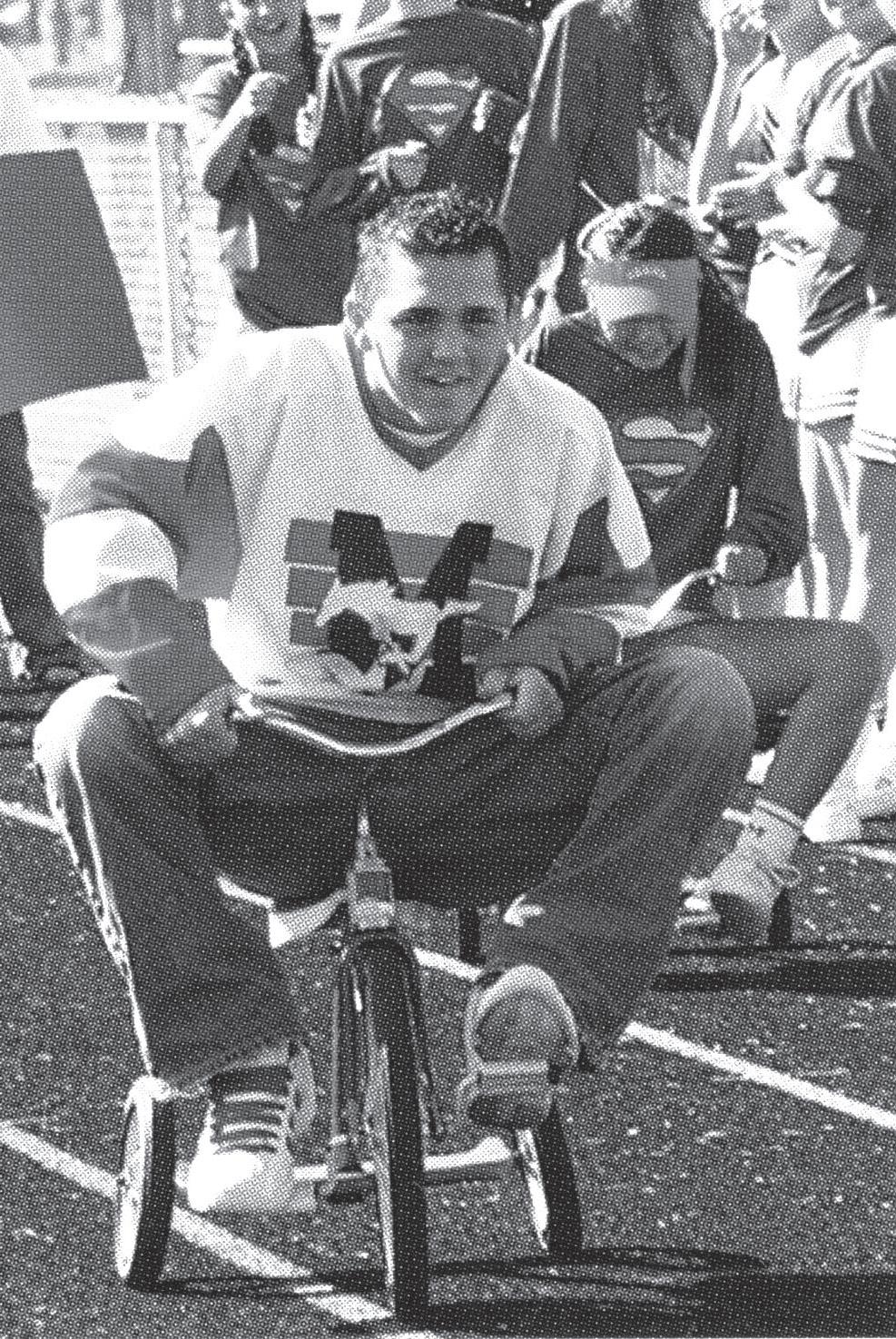
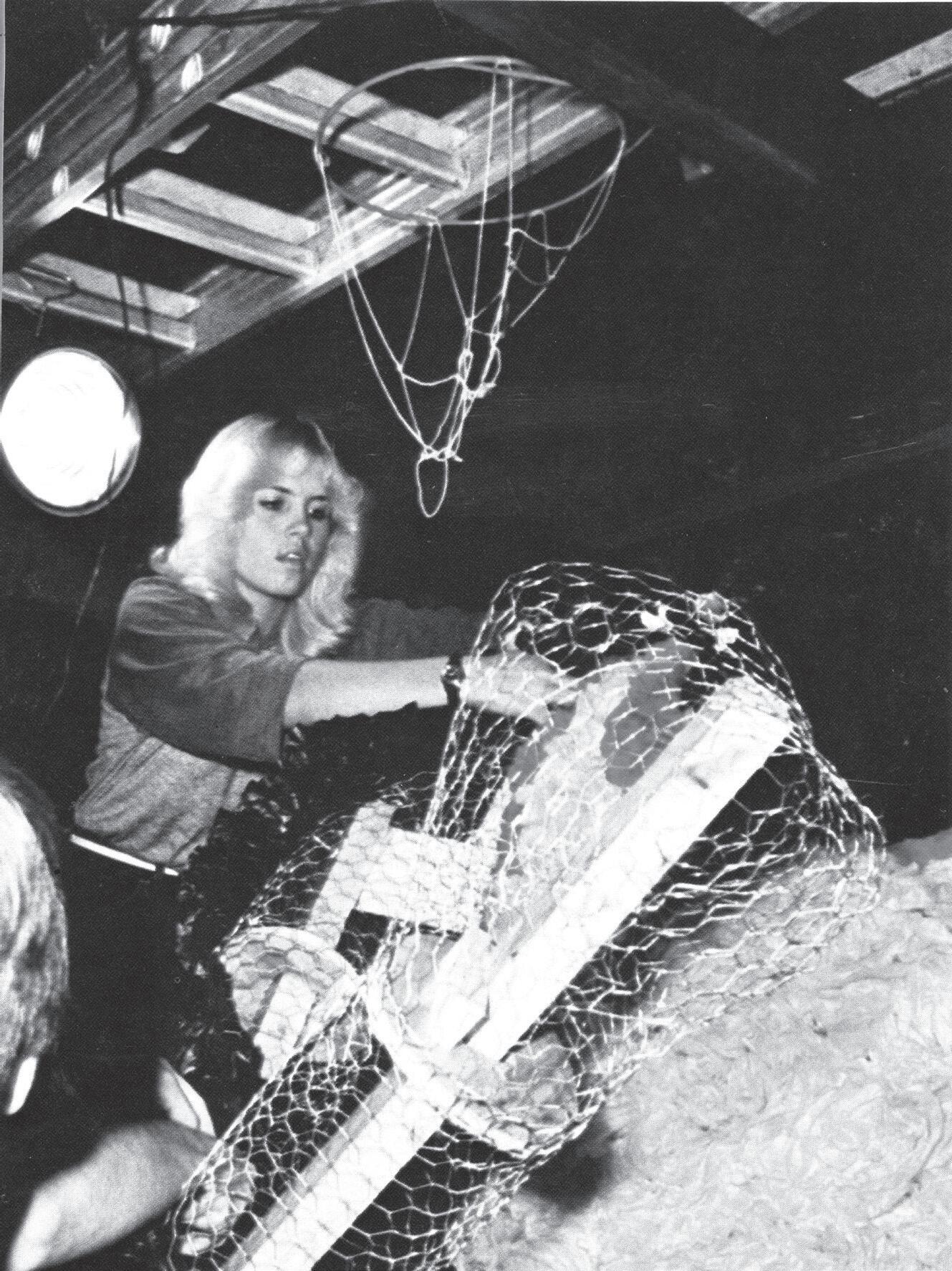
Forty years ago...
During the 1982-83 school year, the community petitioned for an elected school board instead of appointed. The school board proposed a 7-period school day to fit more classes into students’ days. Throughout the year, many changes to curriculum and teaching style were proposed.
Thirty years ago...
Along with introducing new technology such as early Macintosh computers, there were also many policy changes during the 1992-93 school year. In August 1992, the school board made all Munster schools smoke free. They also made sexual assault an official school violation. Taking place over the entire school year, the North Central Organization sent a visitation team to study the school’s academics, organization and athletics. They gave critiques, saying MHS’ weakness was vocational education.
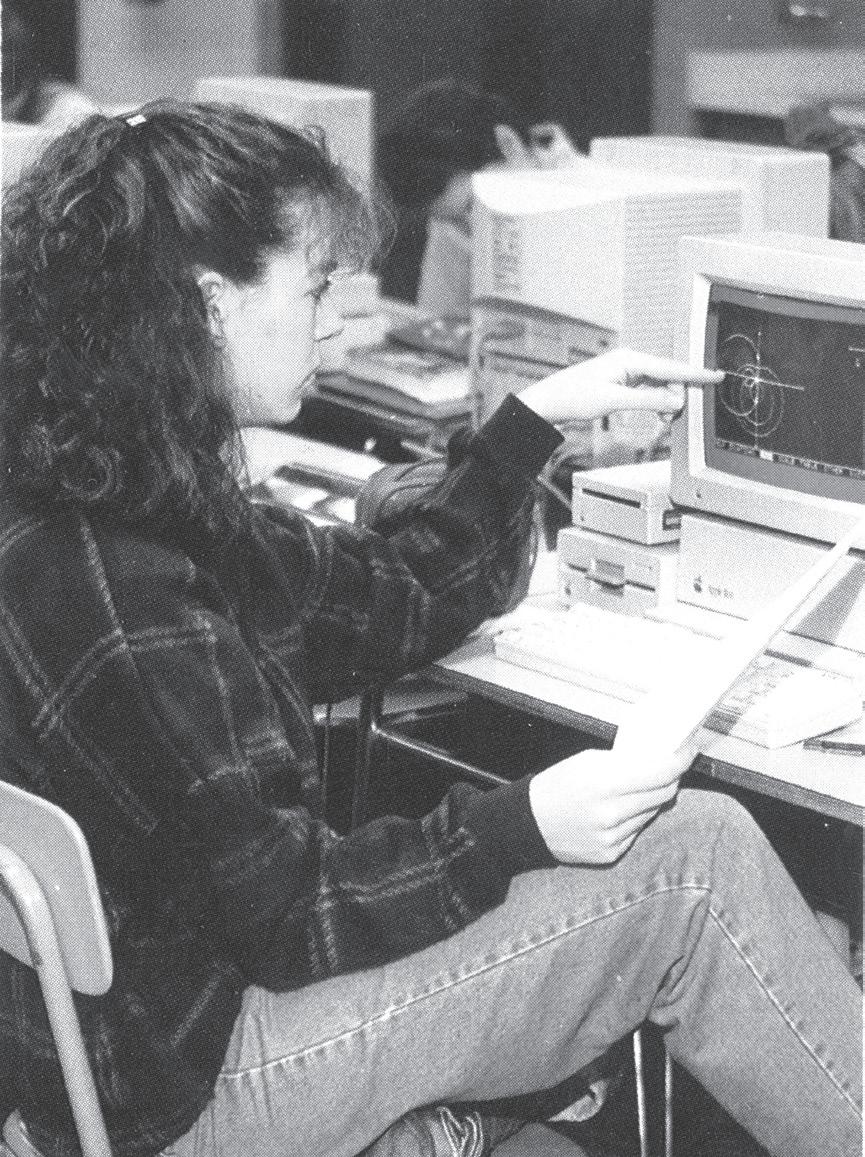
Twenty years ago...
Starting off the 2002-03 school year, the Supreme Court gave schools the power to randomly drug test students after two years of it being prohibited. Moving further into the school year, teachers started to worry about class sizes increasing from the average of approximately 25 students to almost 30 per class. Today, class sizes continue to increase, with the average being approximately 35 students per class. It remains an issue, especially with the number of teachers leaving the profession.
Ten years ago...
Following the school shooting at Sandy Hook Elementary School in December of 2012 and a shooting at Southlake Mall, students became more concerned with safety at school and in the community. Also due to the 2012 election, there was an increase in students interested in politics. Talk of legislation regarding guns in schools began to become more prevalent, which continues to be a largely discussed topic today. Despite the highly competitive nature of MHS staying the same, students and staff became less focused on school policy change and more concerned with state and nation wide education issues.
culture and history. friday, april 21, 2023 04
TOSS BOSS Twirling her baton, Robin White, junior, performs a routine with the majorettes team. Along with the cheer team and drill team, the majorettes was one of the only sports girls could participate in. The team did not have to do any funding that school year, since so many members made their own new uniforms. (source: paragon 1973)
CRAFTY CONSTRUCTION Working on the float for the homecoming parade, Heidi Hansen, junior, adds flowers to the Daffy Duck float. Until the last few years, CEC members used to make floats, attach them to trucks to show off during the homecoming parade and then burn them in a bonfire at the end of the night. (source: paragon 1983)
NEW SOLUTIONS Working on her trigonometry homework, Amy Stover, junior, uses a graphing calculator on one of the brand new Macintosh computers to help her with polar equations. (source: paragon 1993)
TRI ME Riding a tricycle, Grant Burdeau, sophomore, makes his way down the track at the homecoming pep rally. Although some pep rally activities such as the tricycle race and watermelon eating contest have not been continued, the tug-of-war competition has remained tradition. (source: paragon 2003)
SCREAM AND SHOUT Yelling in the crowd, seniors Taha Quershi and David Carbajal cheer on the Boys’ Basketball team at the game against Andrean. Munster won 52-50. (source: paragon 2013)
Hiba Fatima, senior, 11,890 minutes remaining.
The days stuck together like pages of a fresh book: slow and exhausting to get through. Hiba Fatima, senior, had always considered herself a “math person,” and found English classes about as enticing as the assigned readings. So, as she clicked onto the zoom link of her English 10 class with Mr. Ben Boruff, she expected nothing more than another class in which you “read this” and “answer that.”
“That class truly activated my critical thinking skills,’” Hiba said. “There was always something philosophical. The impact of that class started branching out into my other classes that I took later on, and then within my own life in terms of how I view my friendships, relationships and myself.”

The moment Hiba began to notice how different Mr. Boruff taught the class was in the middle of “1984.” During a lesson, Mr. Boruff dove into symbolism within the book—how the paperweight symbolizes Winston’s want for the truth paralleled Hiba’s moment in which the book truly came to life. The class emphasized details were not fleeting, but embedded with purpose that was meant to be carefully picked apart. Where previous English classes taught Hiba to senselessly read passages to answer questions, the class gave her a purpose to look for.
“I didn’t really start writing until after that class, so when I did start writing, it was a lot more purposeful,” Hiba said. “A lot of my poetry is really personal to me, and it helps me work through emotions and feelings—crafting words to detail them helps a lot.”
Annabelle Spicer, junior, 85,690 minutes remaining.
“You all should start looking at colleges, we really need to start working on getting ready for that.”


Annabelle Spicer, now a junior, and the rest of her eighth grade Intro to Engineering and Design class stared blankly back at their teacher, Mr. Matthew Backs. Glancing around at students’ worried faces and hearing others say “I started SAT prep in seventh grade, I’ll be fine,” she started to panic.
“I was like, hey man, I’m thirteen,” Annabelle said. “I don’t know what I’m doing. I wasn’t even thinking about college, I didn’t even know what I wanted to do yet.”
Making her way into high school, her options seemed as if they were already narrowed down. The excite-

BACKTALK
what is your favorite memory at MHS?
“Friday football nights at the beginning of the semester. Those nights bring a lot of fun memories and the way everyone shows school spirit, no matter if they won or lost.
brianna vale / senior
what is your favorite memory at MHS?
“The art club holiday meetings. Last year’s Christmas party because there were just fun games and people having fun. No one was negative. sofia arredondo / sophomore
ment Annabelle felt about the various art classes in sixth grade diminished as those career paths became seemingly discouraged. Surrounded by her peers who had long ago decided to follow in their doctor parents’ footsteps, she felt as if STEM was the only option.
To Annabelle, the priorities of Munster schools had been apparent since budget cuts during her time at Elliott Elementary—the arts had less value. For a while, she felt her passion for art was always drowned out by people encouraging more “reliable” majors.
“It felt like just because I’m not a math person, I wasn’t as good,” Annabelle said. “I wasn’t good enough because art isn’t valued as much. I felt like I wasn’t as good at anything.”
Despite feeling that students have mellowed out when it comes to the constant competition in academics, anxiety induced by the never-ending
list of assignments still plagues her junior year. After reluctantly contacting Mr. Ben Boruff, English teacher, about why she was behind on assignments, a wave of relief washed over her at his accommodating response. Although many teachers have been speaking about mental health, Annabelle feels that with Mr Boruff, she didn’t have to “prove herself” in order for him to understand.
“For the longest time, it felt like there was no adult that I could understand or confide in,” Annabelle said. “Only after knowing Mr. Boruff for a couple months, he’s already very understanding and trusting.
Rhiannon Shelton, freshman, 233,290 minutes remaining.
“I didn’t have the confidence I have now,” Rhiannon said.
People were shuffling out of the auditorium after MTC’s opening night of “Breaking the News.” Costume designer and actress Rhiannon Shelton, freshman threw open the back door of the auditorium. Blinded by the sun, she heard the sounds of the marching band practicing. Full of emotions, she was both excited and nervous for what was to come in the next few nights. Her eighth grade self wouldn’t ever imagine pursuing theater or show choir.
Entering the ninth grade has helped her find who she really was. Now being in theater, she has made friends who support her. Before, Rhiannon was scared to receive backlash or be labeled a “theater kid.”
Although she was always into movies, Rhiannon never showed interest in the performing arts. “I never really paid attention to elementary music classes because I didn’t think it was gonna be important to me,” she said, “But no, it’s one of the most amazing things I’ve ever been in.”
Being able to express herself in high school has changed her outlook on artistic education.
“We have amazing programs that have definitely helped me grow as a person,” she said. She is thankful for all the opportunities MHS has given her. To building relationships and learning new skills, Rhiannon says she will push herself to get further out of her shell. Producing her third set of costume designs, Rhiannon is eager to work with other MTC staff to improve her design skills in the next show, opening May 4, Spongebob: The Musical.
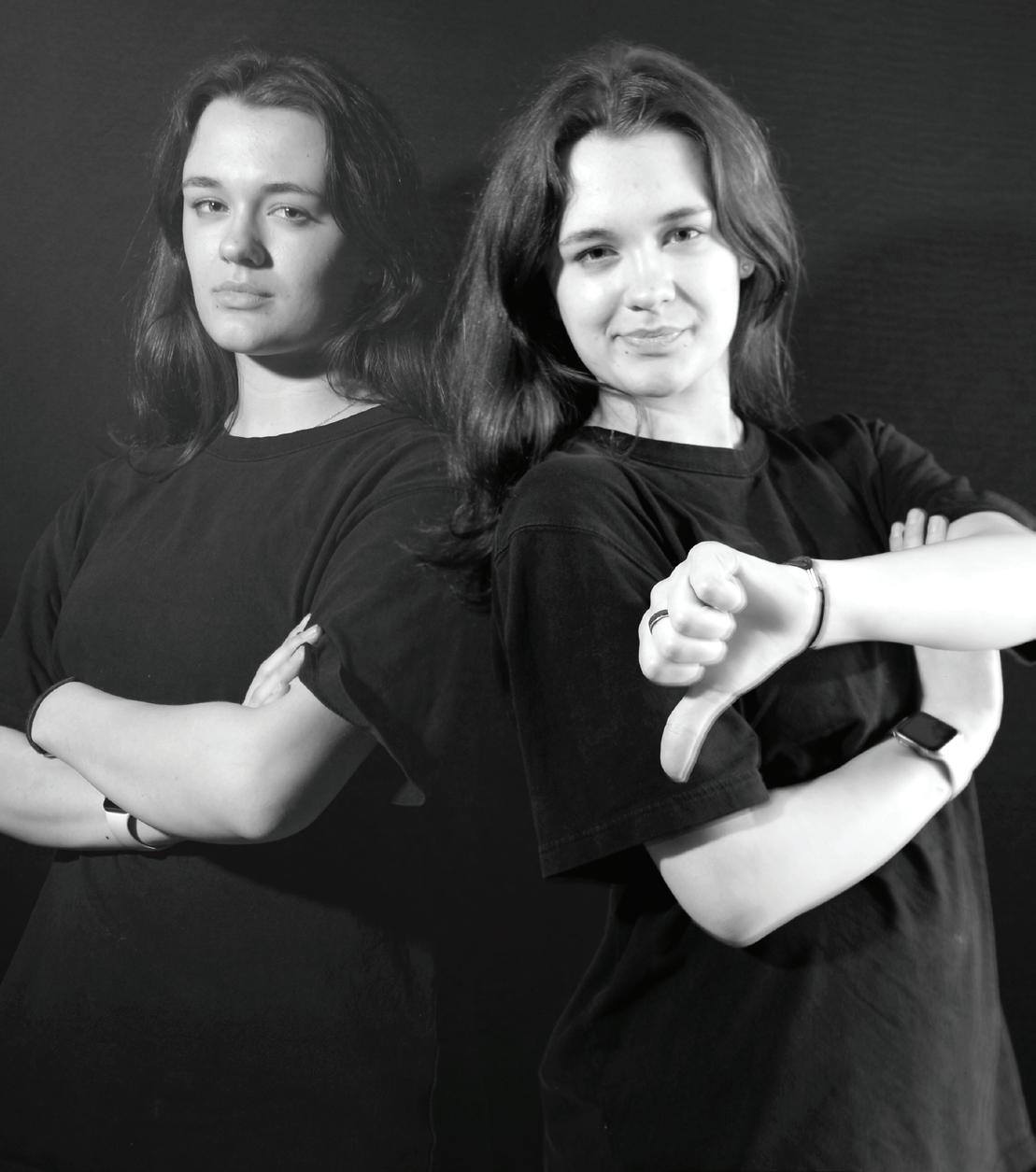
student
friday, april 21, 2023 05
narratives.
photo by josephine mittelberger
photo by marianna young
L.Cruz, senior, 11,890 minutes remaining, 198 hours remaining, seventh hour AP Psychology
Heads or tails. Tails or heads. Heads is ask—no, now tails is ask.
L Cruz, then a junior, flipped the coin in front on top of her laptop, as she sat in her seventh period AP Psychology class. This was the way L made most of her decisions—but more often than not, it led to this: flipping the outcome with each flip of the coin. “Alright, I’m going to tell him,” L thought, palms sweating, trying to rationalize the fact that she needed to ask for help.
No one usually ever stayed behind in Mr. Matthew Kalwasinski’s, Psychology teacher, class, but that day, after L had spent all day racking up the nerve to ask—to ask
BACKTALK
what can be done to improve the education system?
“Standardized testing isn’t a good way of getting information. It places emphasis on such a narrow set of skills that doesn’t accurately represent the person taking it.”
jordan munoz / sophomore
if L could stay in that classroom for lunch after getting picked on for weeks—someone stayed behind.
“Mr. K looked at me after, and he was like, ‘oh, what’s up?’ Boisterous, really loud. And I just burst into tears,” L said. “In the rush of things, I explained everything that was happening and how I needed somewhere to go. Especially during the second semester, I started getting picked on. I didn’t have anywhere to sit because I had gone through a bit of a fallout with the only people that I knew, and really talked to, so it was devastating for me socially.”
Asking for help in that moment was not the only thing that changed the trajectory of L’s time in high school. Prior to that year,
to that class, everything in L’s life had felt as though it was burning. During the pandemic, school had simply felt like a joke—she had lost several family members, the state of the world was awful and it had gotten to the point where L didn’t even bother checking PowerSchool anymore.
But that changed with Mr. K’s class. There was finally a structure, unlike the time spent during eLearning. Everyday was the same, but not in a way that lacked meaning. There were no surprises, no sudden due dates, nothing that could harm her.
“The formula was perfect for me as somebody who needed organization to get back into school,” L said. “It was just the perfect and I really kind of blossomed under the
feeling of wanting to do well and wanting to succeed in my class because like, I want to do well in that class.”
Now, in her senior year, L aids for one of Mr. K’s classes.
“Getting to stay during lunch was really nice, and I have a lot to be grateful for,” L said. “If I hadn’t had that support system— he introduced to the school social worker—because of Mr. K and his spirit and the resources that I was exposed to; I never really had influence. I never really bothered trying to ask for help, because I had poor experiences in the past, but like, I aim for Mr. K now. He was actually the one to tell me that I won the creative writing contest. He has some of my artwork up in his classroom.”
as told by Reena Alsakaji
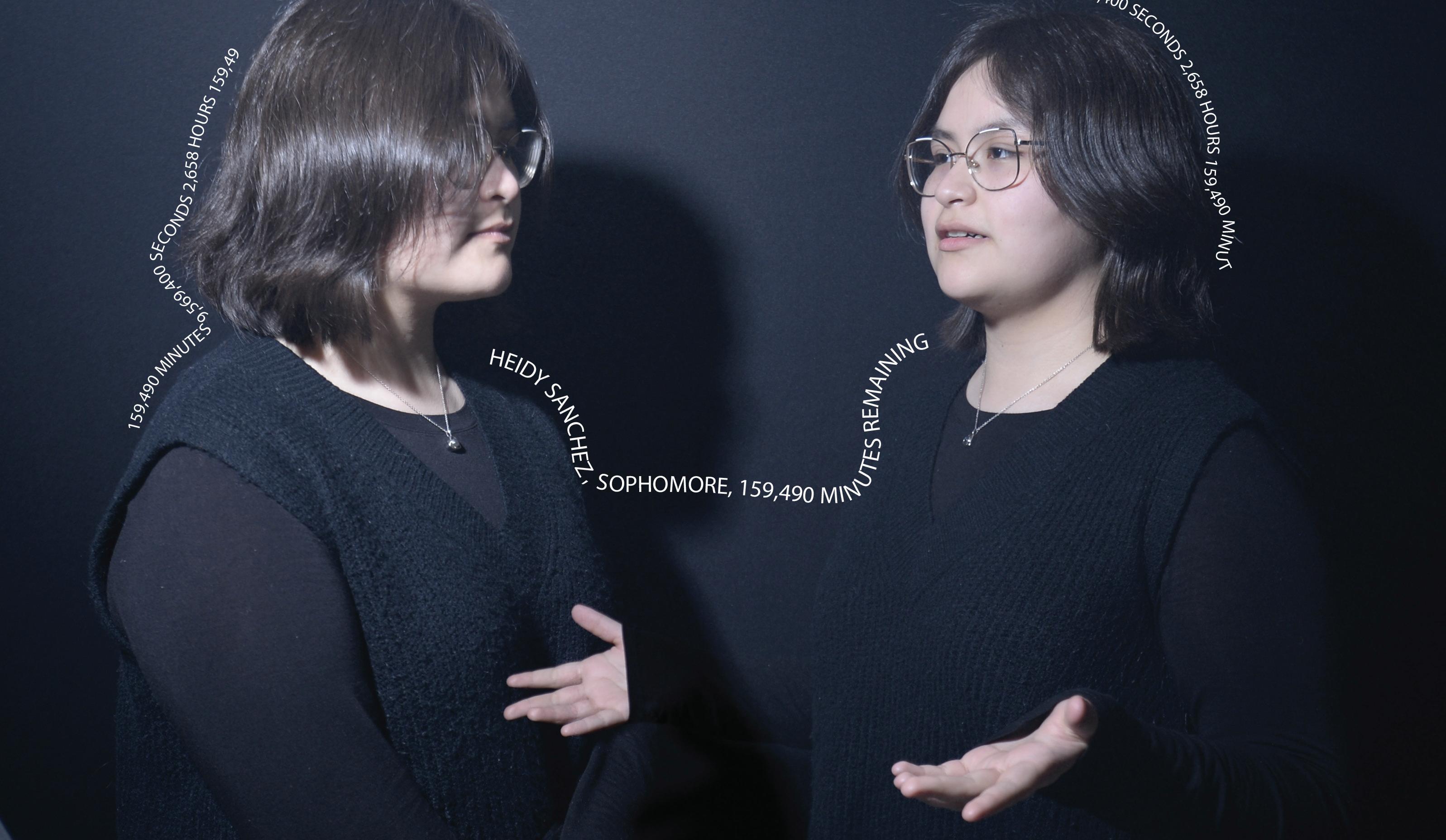 editor-in-chief
editor-in-chief


“I can actually do this,”
Heidy Sanchez, sophomore, thought. As she sat in her middle school classroom during freshmen orientation for Link Crew, she found herself explaining, comfortably, the high school to incoming freshmen. Suddenly, her previous
desires to become a teacher had not felt as daunting.
The year prior, Heidy could have never imagined herself doing something like this—she was far too scared to ask questions. It was almost an impulsive decision, when she saw that email sent by Ms. Szafasz—but it was one she knew she needed to take if she ever wanted to see how she would thrive.
Creating a comfortable environment for students is a goal Heidy intends to carry with her, as it was this environment that allowed her to thrive.
“I know that there are a lot of teachers that I can look back,” Heidy said. “I remember them because they were good at what they did. Then during summer break when I miss be-
ing at school, the environment that really made me think about it more because it’s this is kind of an environment I would like to be at in the future”
Part of what built up to that moment was Heidy’s own experiences during the pandemic—but also, what it is like to learn by choice. She had always dreaded when teachers would call on students names randomly—but in classes like Mr. Barnes’, she felt inspired to participate by choice.
“Mr. Barnes is very real with students. He’s the type of teacher you can connect with,” Heidy said. “They’re themselves around you. Those are two teachers this year that I have right now that I’ve been able to open up more in the class and just asked for more help and stuff because I felt comfortable.”
‘How could anyone else understand if they did not grow up this way?’
A student sitting rigid at their desk, fully engrossed in their work.
This is a scene every teacher sees any day of the week, but for an anonymous student this could not have meant more.
Coming from a low income family, Anonymous had to pay for all of their own fee payments when it came to extracurriculars and it caused a lot of pain. The anxiety of telling the sponsor they cannot pay again, the fear that their peers will somehow find
out and the isolation of not being able to tell anyone that they are struggling.
Too embarrassed to share what they were going through, Anonymous became more isolated, and their fears grew.
While they have felt money anxiety over things such as food and water bills, Anonymous had never been in control of spending the money. With $15 to spend a month and club sponsors putting on pressure to do more costly events, there was nothing that could be done but to sit in (discomfort) during school, anticipating and running over how they will tell their sponsor they cannot pay. Never
comfortable with the idea of opening up to even their closest teacher and friends, all Anonymous could do to take their mind off the pressure was to pour their attention into schoolwork. Yet no amount of work could fully take their mind off what was to come after school, and their grades began to slip.
But the anxiety did not stop there.
As time went on, the club became too much and they had to drop out as it stopped being enjoyable and caused more stress than joy. The hours spent at school just waiting to go home and cry to finally release the pent up emotion did not cease. There was always
something else to stress about: new clothes, other extracurriculars, friends asking for favors.
It all becomes too much and there is nothing left to feel but anger. Mad at themselves, mad at their parents and mad at those who have the privilege to afford it all. All of that freedom.
How could anyone else understand if they did not grow up this way? Anonymous could try to explain, but there will always be a be a disconnect between themself and those they would try to open up to.
So there they sit. Silent.
student narratives. friday, april 21, 2023 06
photo by zoe clark
‘her previous desires to become a teacher had not felt as daunting’
March 28, 2023. Having been torn away from the unfamiliar comforts of my hotel room bed, I, alongside my parents, braved the cold air to reach a pristine white concrete and glass building of Iowa University’s Pomerantz Center, where a group of college students checked each visitor record.

“Are you a junior, or a senior?” one asked.
“Sophomore,” I hesitantly replied.
I was mildly sleep deprived then, but even to me, the surprise on his face was evident. He would not be the only one, either: whenever I would complain to someone about that two day college tour, more often than not I would be met with confused stares.
“But you’re a sophomore!”
Still, a second student gave me the quick information needed on how to get to the actual presentation. Next thing I knew, I
Out with the old, in with the new
Sitting in a classroom worth of gaudy costumes and face-painted students wasn’t what senior Danish Akbar was expecting during his first week at Munster since his move from Botswana, Africa.

“At this point, I’d just joined the school during homecoming week,” he said. “And since I was new, I couldn’t ask anyone I knew to tell me what’s going on.”
Danish’s older brother graduated in the class of 2021, and their parents set on transferring his education to a college in the U.S. due to the limited options of postsecondary options in Botswana. Danish was soon to follow this similar arrangement, graduating the following year, until covid struck. The severe pandemic regulations in Botswana prevented him from continuing his third year of high school. For his own future, Danish and his brother moved in with his aunt and uncle, leaving behind their world to start anew in Munster.
Along with the cultural shocks of an
was back into the cold, walking towards the Old Capitol building of Iowa City. I stepped across its threshold, and up past the old, creaking stairs. Finding a seat on uncomfortably hard wood chairs, the minutes moved by like molasses. The admissions counselor droned on, yet another spiel that I struggled to remain attentive to, but one thing stuck out to me: the high school class requirements.
The ones we are not told are needed.
Yet, in a room full of juniors, who have very little time to get these credits in, and seniors, who are stuck with the transcript they had built over four years, I could not help but wonder: how many people are caught off-guard, too late.
Next thing I knew, I started digging. Whether this was spurred on by yet another college-anxiety induced haze, or because I was just genuinely curious, I took a leap into the rabbit hole of the standard minimum requirements of most colleges out of
state.
As a general rule, the Core 40 diploma does meet the minimum requirements (except for mathematics, but Munster sort of covers it by requiring a math course/reasoning course each year). The problem here is that colleges expect you to do more, and that level can vary depending on the college. The extent of which you might not be aware of in time, unless you start looking early.
Yet we find ourselves without an adequate support structure to help us prepare. Is this meant to be something we do on our own? Are we supposed to be so self-sufficient that we have to have a plan for high school classes from the start of freshman year? How is that fair, when so many of us still do not know who we want to be?
I’ll leave this with one final metaphor: if we are Mustangs, then we are mustangs that have lost our legs, waiting unknowingly for the wolves of college admission experts to arrive.
With 7:29 p.m. just around the corner, seconds turn to minutes, and minutes turn to hours. Omar Safi, junior, is close to breaking his fast for Ramadan and has to distract himself— setting the table, reading the Quran, going on his phone—to make time stop ticking by so slowly.
Having participated in Ramadan since he was 12, this concept is not new. As the years have passed, the difficulties of fasting have faded and Omar gets to focus on what Ramadan is truly about.

“When I was really young, out of perspective, I thought it was more about being vigilant,” he said. “But during Ramadan we fast because we want to feel how the less fortunate feel. As I grew up, I started to recognize how people were dealing with these hardships. So I try to feel how they feel, and just experience what they're going through.”
With Ramadan following a lunar calendar, it has only begun to take place during the school year as Omar was in middle school. During his fasting through the school day, he has always had to sit in the cafeteria, watching everyone else eat. This year, Mrs. Laflech opened her doors to students fasting, aware of how difficult it can be to fast in unfamiliar or uncomfortable settings. As years have passed with Omar gaining knowledge through his parents and mosque, Ramadan has given him many opportunities to bond with others on a multitude of levels. With friends fasting alongside him during difficult times—like during track when his fast is about to break and all there is to eat is a date before he has to run—and with family being there at the end of the day to break his fast with, Omar has been able to grow and appreciate what Ramadan has to offer.
“There was one specific time when I was maybe 13, I was with my family and they came over but the power had gone out,” Omar said. “So we were just sitting in the dark all throughout the day and eventually it came back on. It was time to break our fast and we stayed up all night, talking, hanging out and enjoying each other's company.”
READ MORE NARRATIVES FROM JOURNALISM 1 ON MHSNEWS.NET


Danish Akbar, senior, 11,890 minutes remaining
American school from a non-uniform policy to an abnormal amount of breaks, All the new opportunities opened Danish’s eyes to a new realm of possibilities for this future, leading him to his position today as co-president of the Muslim Culture Club. He plans on attending Purdue University in Computer Science this fall.
“Before I moved here, I really didn’t know what I was gonna do. In Botswana, there’s no postsecondary education options after high school. You graduate and that's it,” he said. “But here, I realized how many options I have during my time here and after high school. It’s really given me something to look forward to and how I’m gonna achieve it.”
for this special issue of crier, Ms. Sarah-Anne Lanman's Journalism 1 students wrote their own narratives.
“It’s almost like students are afraid to be wrong or to speak up about their opinion."
noemi cabrera-gonzalez / freshman
"If you're not helping yourself, you can't help others."
kylee barnes / sophomore
“Do not let fear be the reason for missing out on the friendships and a good time."
brandon trilli / senior
as told by page editor student
friday, april 21, 2023 07
narratives.
Omar Safi, junior, 85,690 minutes remaining
Emma Starkey, sophomore, 159,490 minutes remaining
written by emma starkey, journalism 1 student
"Is this meant to be something we do on our own?"
photo by josephine mittelberger
photo by josephine mittelberger
photo by ethan pischner
emma starkey, journalism 1 student
Only so much time
Teachers and students discuss balancing mental health and time in the classroom

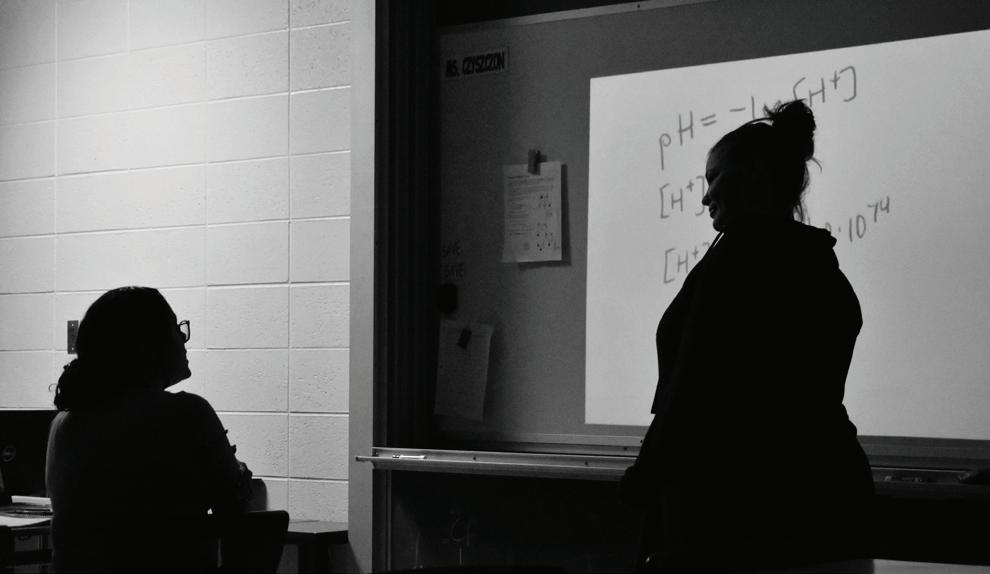
“We’re here in an effort to change and better the current reality of student mental health at Munster,” the flier read. “We hope to influence the growth needed to accommodate the students.”
Mental Health Club’s co-presidents, Olivia Evilsizor and Jocelyn Lemus, and vice president, Hiba Fatima, held a presentation for the teacher and staff faculty March 23, promoting ways that teachers can connect with their students and create a comfortable environment in their classrooms. Olivia represents the MHC and empowers the voice of the student body.
“We had a flier that included some mental health statistics on the front and three different scenarios on the back,” Olivia said. “The whole foundation of the presentation was how teachers can better serve students’ mental health and make school a more comfortable environment.”
While Crier began reporting on this story with the focus of student mental health, discussions with teachers and staff opened our eyes to issues that teachers face with their own mental health, a topic often misconceived by students. While the leniency in classrooms has been at an all-time high since the lockdown, this puts a lot of pressure on the teachers to lay down the law, creating a double-edged sword between educators and their students.
“In essence, you’re all still kids, and you’ll
do what’s going to be best for you. You’re not there to take care of older people,” Mrs. Kathleen LaPorte, social studies teacher and Munster Teacher Association representative ,said. “But where I do think we’re lacking and where help could come is following rules. Let’s just try to be respectful of the policies and procedures in place, and it could make all the difference for teachers.”
However, teachers are often under the same pressure students are, and that takes a toll on their mental health just as much as students.
Crier took the time to speak with our adviser, Ms. Sarah-Anne Lanman, about some of the most common issues teachers face. Teachers can feel a lack of control: they need to follow rules from the legislature and administration. When problems arise, it can be difficult to voice concerns or get help. A lack of feedback opportunities can make certain professional development activities hard if teachers don’t fully understand why they are doing those activities.
Another problem is time: there’s only so much time in the day and many things that need to get done. According to the teaching contract, teachers must be at work from 7:15 a.m. to 2:55 p.m.— roughly a seven hour day. However, meetings like PLCs often take place in the morning, leaving little time for planning. Although administrators say teachers shouldn’t have to do any work for school outside of their contracted hours, social studies teacher Mr.

Scott Stalbaum finds days when he works 1214 hours a day for school.
“Being able to both get your grading accomplished and teach the things you’re supposed to teach in the way the school expects you to do it in the day can be kind of rough,” Mr. Stalbaum said. “Like it or not, those things usually demand extra time you don’t have during the school day.”
In the position of the student, Jocelyn promotes ways to keep her own balance with teachers by exchanging the same respect.
“I feel like we can put more effort into caring about our teachers,” Jocelyn said. “If a teacher asks how we’re doing, we could reciprocate it by asking them the same thing.”
Visit


BACKTALK
what is your favorite memory at MHS?
“The bus drives after a soccer game, especially if we won, we got to chant on the way home. karissa cano / freshman
“When we had homecoming outside.”
juliette dixon / junior
to see more photos
For Crier’s special issue, Ms. Sarah-Anne Lanman’s Photography class took photos that showed student’s every day lives
BENDING ABOVE THE BAR Practicing her techinque, Chloe Averilla, sophomore, practices high jump for the Track and Field meet on April 15. (photo by keya patel) DON’T OVERREACT In an after lesson discussion, science teacher Ms. Amanda Czyszczon, indulges in a conversation with her students. (photo by heidy sanchez) A TEAM EFFORT Freshmen Raghu Subramanian, Lucas Ferguson and Jose Lemus work on biology project. (photo by michael harris)

friday, april 21, 2023 student life. 08
mhsnews.net
7 15 A M - 3:00PM 7 h o u s a n d 51 yadasetunim 581 ad y s a y e a r80475 minutes a school year 715AM -3:00 P M 7 hours and15minutes a d a y 1 58 yad s 57408raeya setunim loohcsatneps aey ow k ng s t r e s s , t i m e m a n a g e m e n t , mental health 7 1 5 A MMP00:3 sruoh7 dna 51 setunim a yad 581 raeyasyad 715AM -3:00 P M 7 hours and15minutes a d a y 1 58 yad s 57408raeya setunim loohcsatneps raey ow k ng
photo by josephine zangrilli
NAILED IT Strengthening the infrastructure of his mock home, Adam Muntean, junior, installs an outlet box for wiring. “I enjoy the ACC because it’s more hands-on than regular school and it’s teaching me what I want to do in my future,” Adam said. WELD DONE During their time at the ACC, Garrett Pazdur, senior, and Hunter Zager, junior, work on welding a trailer built from scratch. (photos by marianna young)
Building a future at the Career Center
In the back of a blaring ambulance, Jillian Childs, senior, arrives at the scene of the car accident. Thankful that the patient was not injured, she treated the patient just like any EMT would. With other EMTs beside her, she checks their vitals, assesses them for any possible head or internal injuries, and luckily does not have to transport them to the hospital.
Jillian has been able to help with transport and ambulance shifts, take vitals, perform EKGs for patients and complete lab work in the ER within the EMT program at the Hammond Area Career Center (ACC). The ACC provides 15 career learning classes, from cosmetology, emergency medical devices, criminal justice, culinary, construction and more. Going into junior year, students have the option to apply for the ACC. The MHS students who attend leave after their third hour and are bussed over to the ACC building, which is about 15 minutes away, for the remainder of the school day.
“I have never enjoyed a class more in my life,” Jillian said. “Mr. Ryan Cogdill has been
an amazing mentor who offers many opportunities for his students. While the course is difficult, it has given me a big advantage for my future in studying nursing in Florida post-high school, and I am now a licensed EMT in Indiana and Florida because of the program.”
Sixty-two Munster students currently attend the ACC. One of the students who attend, Keira Trimolt, junior, appreciates the more hands-on learning that the ACC demonstrates in comparison to MHS.
“I feel a lot more awake and interested when I am at the ACC,” Keira said. “The hands-on learning style of the ACC is better suited for me and has allowed me to explore the criminal justice field more immensely with this style. I have been on many trips, including to local jails and the Lake County dispatch center, that have greatly expanded my knowledge on the field as well.”
On top of the many specific trips and programs within each career class, SkillsUSA is a nationwide competition opportunity available to all ACC students to individually compete with their career knowledge and skills. The most recent competition was held from April 14-15 at the Indianapolis State Fairgrounds. At this State competition, Adam Muntean, junior, was elected as a State Officer to go onto nationals in June to compete in the leadership competition.
“I am just very excited for nationals in Atlanta and to meet lots of new people there,” Adam said. “It feels really cool, and I am proud to have this leadership role. I get to represent Indiana at the national conference, and I have the opportunity to go to Washington, D.C. to talk with legislators on why Career and Technical Education schools should get funding.”
Working with Adam in the construction class, Elijah Lukas, junior, enjoys going to the ACC to learn about his field of interest, but is also grateful for the opportunity to collaborate with and meet students from other schools. He finds that the ACC has efficiently been able to stress the importance of teamwork and cooperation, especially within the construction field.
“Everyday I work with students from, not only Munster, but also Morton, Hammond Central, Whiting and Calumet City,” Elijah said. “One of the many things we did together was build small mock houses to learn the importance of the different roles each person plays when working on a construction project. Teamwork is important. Especially if I choose to join the construction union, a provided opportunity for ACC construction students, after graduation.”


With the lessons and many opportunities provided to her at the ACC, Mia Cartagena, junior, feels more prepared for her future.
Not only has she learned several lessons about her field of interest, health science, but she has also noticed a positive shift in her own desire to learn.
“I am learning about something that I could do in my future and that I am interested in, so it makes me work harder when I am there,” Mia said. “The ACC has overall made me more focused, more hard working and has been a really good change for me.”
BACKTALK

what is the most valuable part of education?
“The opportunities it allows you to have and the access to resources you have as a result.”
lauren robinson / senior
what can be done to improve the education system?
“Students should feel more comfortable in learning environments.”
katherine eisha / senior
PROM SPECIAL
For
Choose one appetizer, one entree and one dessert from this select list (soups vary by day and soft drink included)

Entree
• Chicken parmesan with spaghetti
marinara
• Lasagna
• Gnocchi with your choice of sauce
• Linguine primavera
• Sautéed seabass
fillet with veggies
Appetizer
• Choice soup
• Choice salad
Dessert
• Cheesecake
• Tiramisu
• Carrot cake
• Chocolate cake
education. friday, april 21, 2023 09
“I have never enjoyed a class more in my life.”
Jillian Childs
page editor
the entire day of prom, you can show your student ID to get a three course meal at Giovanni’s for only $25
(219)836-6220 603 Ridge Road Munster, IN 46321
In memory of Ms. Virginia Eib, our appreciation
substitute for MHS. Services for Ms. Eib will be held tomorrow at the Westminster Presbyterian Church at 11 a.m.
For this issue ofCrier, we knew we wanted to dedicate a page towards appreciating our teachers. In memory of Ms Eib, English teacher, we wanted to highlight our appre-ciation toward her and the many students whose lives she touched.
what. Whenever I talked to her about any-thing that happened in my life, I could see the empathy and sympathy in her eyes.”
what can be done to improve the education system?
Ms. Virginia Eib passed away on Wednesday evening, April 5. The 2022-2023 school year was her first year teaching English after spending time as a
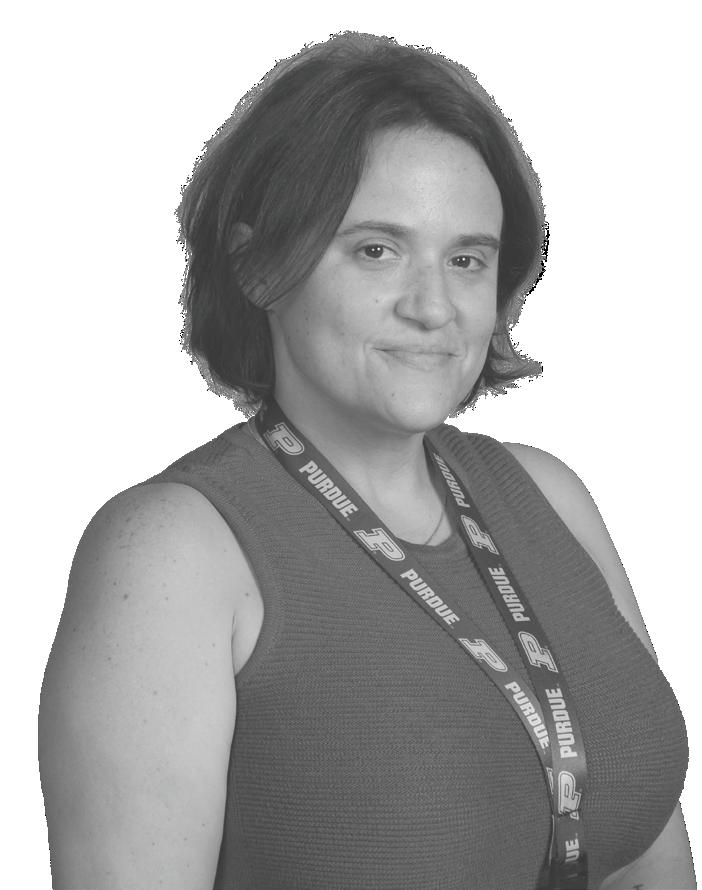
Thank you, Mrs. Laflech
All eyes were on him, but not just any eyes.
The eyes of professional business leaders, corporate innovators, experienced community leaders and business supporters at the 1871 Chicago Innovation Hub for aspiring entrepreneurs. Austin Beetson, senior, was alongside juniors Josh Avila and Sayeed Mohammed as they went onto the stage to perform the pitch for their air fresh ener business: Novos.
Prior to working with Mrs. Kristin Laflech, business teacher, Austin had no interest in going into business. He always enjoyed engineering, as he has de signed many mechanisms using the laser printer and 3D printer in the Fab Lab with the Robotics team. Austin was recommended to the Novos founders in Mrs. Laflech’s incu bator class for help on building the air freshener prototype, and he eventually signed for 12% ownership with the business.
“Along with majoring in mechanical engi-



Thank you, Mr. Beaupre
The evening’s sun glared down on the assemblage of the marching band, scorching their cheeks and blazing the field’s turf. After a major screw-up during practice in class prior to the evening, directors insisted that their rehearsal would be extended an hour longer, stretching into the night until ten. Sophomore Abbie Fuller felt the fatigue weighing down the rhythm of her steps among her other exhausted band members.
In a sudden halt of the symphony, Mr. Adam Beaupre, assistant band director, takes hold of the stage.
“The children are requesting a water break,” Mr. Beaupre ordered.
Abbie Fuller recalls this memory as her first time she felt seen by Mr.
All she brought to us was laughter and enjoyment,” said a junior who wanted their name removed from issuu “The last memory I have of her was when she entered the classroom and she said, ‘assala-mualaikum’ because she knew I was Muslim. In Arabic, that means peace be upon you. All she brought to us was peace. She was a good person and her character brightened up the room because of her laughter and enjoyment. She always had a smile on her face, no matter
She was a very intelligent person,” Mrs. Brook Lemon, English teacher, said. “She had a writing background and so we respect-ed her a lot because she had a lot of knowl-edge. She was just funny, very gracious. She was very sympathetic, empathetic too.”
MHS mourns the loss of teacher and substitute Ms. Eib.
“I would say just talking to her in general. Back when Mr. Shinkan died, she was our perm sub for that class. She was just really nice and we would always talk about life and stuff and I just always looked forward to talking to her in that class and every time I saw her from then on as my sub, I would always smile,” Haidyn Smith, junior, said.
“The relationships between students and teachers in a class because you can have a very easy class and a very difficult teacher to work with, but then a very hard class and a very easy teacher to work with.”
brenden george / senior
what is you favorite memory at MHS?
“When I got a higher chemistry grade than Temi (Ololade, freshman).”
keira allegrezza / freshman
Thank you, Mr. Boruff

neering, I will probably go for a business minor because of the experiences Mrs. Laflech has provided for me,” Austin said. “With Mrs. Laflech’s help with guiding us with financials, making us more confident with speaking, giving our group the opportunity to pitch at 1871 Chicago, and much more, we wouldn’t be anywhere close to where we are today.”
Austin initially built and designed the prototypes for the business outside of school, as he was not a part of Mrs. Laflech’s incubator class. However, for this semester, she pushed him to become an aid for the class so he can have class time to work on his designs. Pushing him even further, Laflech found an internship opportunity for Austin that he now is pursuing.
“Thanks to Mrs. Laflech contacting her sister, the head of the Human Resources Department at the Chicago Magnesium Casting Company, I am now a Project Development Engineer Intern,” Austin said. “She gave me an outlet to show off my engineering and design skills, but it is not just me she has impacted. There are so many other students that she has aided and opened opportunities to.”
Beaupre.
“We went hours without a break in between that practice. You could even hear from the pit how everyone was in need of some sort of water break,” she said. “He recognized the pain and work we’ve been putting through that night and stood up for us.”
Coming from a school band that expected their students to flip open their songbooks and pick up the music by themselves, moving to the Munster district and joining the band her freshman year opened Abbie’s eyes to a world beyond what she’s ever experienced before.

From working through individual sections with his students to buying packs of Globbles for the band to toss at the ceiling, Mr. Beaupre makes each one of his students feel seen and welcome to be a part of the assembly.
“He cares more about the children than the music,” she said. “He’s always valued
his small desk.
Mylee-Ki Gramenz, freshman, 233,290 minutes remaining
A bright yellow suit walked down the hallway, waving to students as he went, before disappearing into a dimly lit room. That was Mylee-Ki Gramenz’s first impression of Mr. Ben Boruff, English teacher. When she walked into his classroom for his second-semester creative writing class, she was met with an awkward silence, a room full of students from all grades gathered together. Almost immediately though, the class began to lighten as the vibe of the classroom setting in.
The room was dimly lit with a series of LED strip lights, tall, color-changing lamps and even a lava lamp set on a table near the whiteboard. His walls were decorated with posters depicting different books, movies and TV shows. A random assortment of objects adorned the whiteboard and a small desk in the front right corner of the room. A few framed photos displaying Mr. Boruff with various graduating seniors topped personal letters and notes surrounding
He began class with a goofy bell ringer about surviving an alien invasion, and his other bell ringers followed a similar format, helping students to get talking and open up. Mylee-Ki began to look forward to his bell ringers, and the discussion that followed. Mr. Boruff helped foster an appreciation for learning that Mylee-Ki hadn’t experienced in other classes. His knowledge of his subject matter and confidence in his students helped them to feel like they belonged and were able to be successful in his class. He allowed for good discussion and encouraged the class to be true to themselves in their writing, writing for themselves and not others.
Wherever Mylee-Ki misses school, Mr. Boruff is understanding and provides extra time when needed. This contributes to a sense of safety and security in his classroom, because students don’t need to worry about him getting upset or speaking down to them when they can’t meet a deadline or need an extension. Mylee-Ki always feels comfortable speaking to Mr. B about issues she has at school, and he’s always willing to lend an ear in support.
teacher dedication. friday, april 21, 2023 10
Austin Beetson, senior, 11,890 minutes remaining
Abbie Fuller, sophomore, 159, 490 minutes remaining
SPECIAL BACKTALK
as told by page editor
as told by page editor
as told by page editor
ABBIEFULLER, SOPH O
MINUTES
photo by connor mcdonald
R MORE, 159,490
REMAINING
me, “Always be sincere, patient and sympathetic. Speak and act with care. You’ll be surprised what students remember.” Years later, I fully understood what she meant.
It was 2018, and I was teaching AP Literature at a school several miles east of Munster. School was busy. Chaotically so.
I watched (and fell in love with) the movie “Coraline” for the first time in with Movie Club, and my National Honor Society student officers created WORMS (Warriors of Reducing Mental Stress)— a peer-topeer counseling program to address mental health needs at the school. At the suggestion of a couple students, I also organized the school’s first lip sync competition.
The day of the competition—Wednesday, April 18, 2018—is cemented in my memory. I began the day by playing Franz Liszt’s curiously imaginative classical melodies as a way of introducing my AP Lit students to the themes of Romantic-era literature. After school, Movie Club members stopped by toby room to eat a Coralinethemed cake I attempted to decorate for a student’s birthday. And that evening, we moved to the auditorium where a large crowd watched fifteen student groups lip sync a wonderful variety of songs, including

“The Greatest Showman’s” “This Is Me” and a particularly captivating performance of Aretha Franklin’s “Respect.” Few things spark as much joy as watching some of your favorite students enthusiastically perform Franklin’s 1965 soul-pop feminist anthem in front of a crowd.
The most impactful moment, however, was the next day when a student placed a letter on my desk. The two-page letter offered a personal story and some gratitude, including this paragraph: “Yesterday I experienced something that I never imagined for myself. I celebrated my birthday in the high school auditorium, filled with a strong feeling of appreciation for everyone in my life. I can’t tell you exactly what you did to help me, and I can’t pinpoint the exact moment where everything shifted, but it did. Somehow I’m here, and somehow I know that you played a role in an elemental change in how I think.”
I have a folder in a bag where I keep important letters I receive from students, and I still carry that bag with me every day. Today, that letter, along with others, rests there as a reminder that sincerity, patience, and sympathy always matter. Even if the impact isn’t immediate.
but for others (especially teachers), it is often the little things that truly make a lasting impact. As I reflect on the past 20+ years of teaching at MHS, I struggle to think of one specific moment where I made an impact on a student’s life, and the reality is that some teachers never know what one thing they said or did that helped a student.
Personally, I think of the daily interactions and conversations that I have with students— the laughter between passing periods, the times students tell me what is going on in their lives and the questions about what Bean and I did over the weekend. It is rewarding when students tell me that my class was their favorite and how much they enjoyed coming to class because of my teaching style, my humor and sarcasm, but more importantly the subject matter: Psychology.
I am very fortunate to teach a subject that I am passionate about, and I think it shows when I am teaching. Psychology—the study of mental processes and behavior—allows students to make personal connections and gives them knowledge that they can use for the rest of their lives. I have had many students tell me that they plan to major in Psychology, and even if they end up changing their mind, it is extremely satisfying to know that I was able to make a subject matter so interesting that they wanted to make a career out of it.
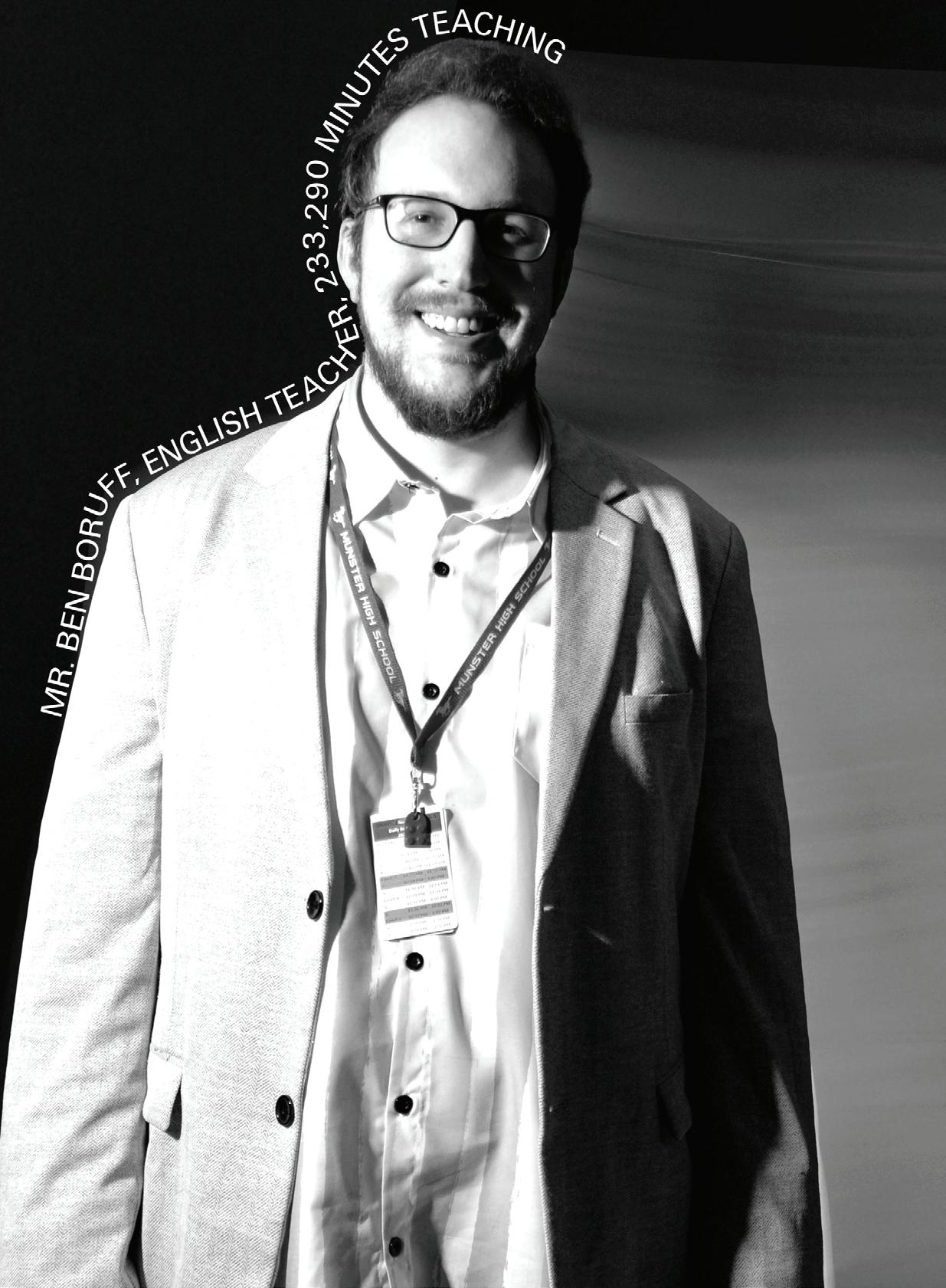

When you think about it, high school is just four years of one’s life and for some, it can be a struggle. If my class can make a student’s day just a little bit better and help them learn more about themselves, then that is the lasting impact that I can hope for. I may never have that one single big moment, but I can make sure that the multiple smaller moments make a difference.
teacher backtalk: what is a moment you realized you made an impact as a teacher?
“I got an e-mail from a student and she said that when she joined my class, she felt like she understood what we were doing a lot better.”
You may not have heard the names of these women before, but each of them had a profound impact on my decision to become a teacher. My first teacher, Donna Carraher, is not only my mother, but was a dedicated educator for over 40 years, serving underprivileged and communities in poverty. Bella Webb, fourth grade teacher at Elliott Elementary School, made her lessons exciting and fun, and encouraged me to create a presentation for the School Town of Munster School Board to allow future students to attend Camp Tecumseh each year. Sheri Miller, sixth grade English teacher, was so motivating that I finished the entire school years’ worth of spelling and vocabulary the first weekend we received
our workbooks. And Nancy Hastings, journalism teacher at MHS, spent literally day and night challenging us to become creative thinkers, writers and leaders.
The voices of these women carried with me as I began college. Starting out at Indiana University as a direct admit to the Kelley School of Business, I found out rather quickly that it wasn’t for me. I had a realization, in my dorm room at Teter Hall, that I should pursue my passion for teaching and working with kids. I was nervous about signing up for a career that didn’t exactly pay the bills easily, but I knew in my bones it was what I wanted to do. Next month will be 20 years since I graduated. Although public
“Seeing my struggling students pass state level tests. That’s something that is outside of me. What we did got them to pass something that was a bigger thing.”
“In my third year, the student body was able to nominate a teacher with the most positive influence, and when they picked me, I realized what I was doing was good.”
“Students being proud of themselves, realizing they are capable, getting excited about learning, and growing as a person socially, emotionally, and in math.”
ms. robyn brown, math teacher mr. thomas barnes, english teacher ms. amanda czyszczon, science teacher ms. lauren holden, math teacher
education continues to take major hits and those bills are not as easy to pay as they would have been if I stuck with Kelley, I am privileged to work with my students every day. Working with my department and educators across Indiana is another passion of mine, to develop our craft, impact student learning and serve our community.
On my whiteboard is a quote from “Hidden Figures,” a powerful film about mathematics, equality and the hero women who fought for equal pay and representation in STEM: “There’s only one thing to do: Learn all we can. Make ourselves valuable.” Great teachers poured into me the love of learning, and I hope to emulate their legacy with my own students.
11
friday, april 21, 2023
teacher narratives.
“Donna Carraher. Bella Webb. Sheri Miller. Nancy Hastings.
“For some, a single moment can define their life,
“Before my first year as a teacher, a mentor told
Mrs. Katie Harris, math teacher, 1,402,200 minutes teaching
Mr. Matthew Kalwasinski, psychology teacher, 1,476,000 minutes teaching
photo by zoe clark
photo by josephine zangrilli
Mr. Benjamin Boruff english teacher, 738,000 minutes teaching
written by individual teachers.
‘Teaching is more of an art than science’
What students actually thrive at Munster High School?
The student performance data has stayed pretty consistent—to almost every student’s knowledge, MHS students rank in one of the highest percentiles in Indiana.
But in that same vein, the gaps in achievement—economically disadvantaged students, students with disabilities, individual race—have remained stagnant.
So, what is MHS—what are teachers— doing to improve this data?
“Not every kid is hitting the benchmarks to be college and career ready,” Mrs. Tammy Daugherty, instructional coach, said. “If what we were doing for all these years is getting the same results over and over again, that’s insanity. What is it that helps bring and close those gaps between vulnerable populations, sub populations?”
Why aren’t teachers in class—why can’t students see teachers in the morning? Or, what goes on when all the teachers in one department leave to “curriculum map”? These are the questions that I asked all last semester.
Eight weeks ago, I started attending meetings to find out.
I went to five Professional Learning Community or PLC meetings, I saw one curriculum mapping session and I attended seven Professional Development or PD meetings.
The idea of ensuring that all students have the right to learn is just one piece behind the Professional Learning Community and Professional Development process. The general approach, according to Mr. Morgan Nolan, principal, is defining what students should know and how they should measure that.
“How do we ensure that it’s not just by selection or by opportunity base that students have a chance to learn?” Mr. Nolan said. “A lot of teachers feel that learning is a choice. I have a fundamental disagreement with that—we have an obligation to ensure students are learning at high levels. I really do think that we should have this mentality of we’re gonna make sure everybody’s learning at high levels. It’s not a choice.”
What do I have to do with it? Keeping this philosophy in mind, I moved to exactly what teachers actually do at these meetings.
Thursday morning meetings: Seeing teachers’ PD
The general premise of these meetings this semester is how to allow students to take charge of their education, rather than simply speaking at them.
Teacher discussion was one factor at all of these meetings. Some teachers enjoy breaking down standards, especially when it comes to talking to other teachers and realizing their own standards are too broad.
There was, I noticed, a clash when it came to creating ‘I can’ statements. In some ways, as I listened in, they allowed students to know exactly what they were learning. On the other hand, is simply putting them up on the board enough?
In addition, some teachers noted, how do standards actually co-exist in the classroom—if each teacher for a certain subject has the same standards, how much does that impact their autonomy? At one meeting, during the breakdown of standards, a few teachers noted that they felt a lack of trust
when it came to teaching in their own classroom.
“The Thursday meetings are rushed,” Ms. Valerie Pflum, math teacher, said. “We keep going, without having stopped and said, ‘Okay, let’s try this for two weeks.’ I do like the PLC process, but it makes me sad some people were not doing it already. It’s not that big of a deal for me to sit in a PLC, but I know 40 minutes once a week is not enough. If you want people’s private ways of teaching to change, you have to provide the PD on it. I hate to say it, but unless you show the Social Studies Department how to do it in a social studies room, they’re not necessarily going to make that connection.”
Mr. Nolan held PD sessions on student ownership of learning during the first semester. When it comes to the teacher meetings, for the most part, students only know that teachers are absent—the meetings themselves are foreign. But Mr. Kevin Clyne, English teacher, believes that while PLCs address the concept of student ownership, it has yet to be fulfilled by the meetings themselves. When staff map out the curriculum, breaking down state standards, they use it as a guidepost for learning.
“The thing is when we get in the room to map, we don’t talk about you as a student,” Mr. Clyne said. “We have never really said, ‘Why are students taking this class? Why not? Because it’s required for graduation? Because I’m often like, ‘How can this be ownership?’ We’ve never talked to a student.”
Daily Meetings: Being Part of a PLC
My next question stemmed from the daily meetings themselves, especially with students wishing for the appearance of contact time, or more designated time with their teachers. What else is it that teachers are doing, then, to benefit students in the classroom? Why should students care?
Each morning meeting I went to varied. Some courses spent time directly looking at tests and how they measure student knowledge, whereas other PLCs spent time with discussion outside the curriculum. However, Mr. Matthew Kalwasinski finds that the PLCs have only been positive in terms of collaboration—though he is the only AP Psychology teacher, he still uses his PLCs as an opportunity to gain more knowledge about writing in AP-style FRQs.
“The PLC process has been an adjustment but only in a good way—it forces people to get together,” Mr. Kalwasinski said. “At the beginning, there were a lot of unknowns on what the point was—what was our goal? But there’s nothing wrong with saying, every day, or once a week, you’re getting together with other people who teach your subject and talk about ‘What’s working in your class? What’s not working in your class?’ I laugh at myself for what I used to do years ago when teaching.”
Reaching a point of no consensus is inevitable, Mr. Clyne reflects—but is that a part of the process? In some ways, it becomes an issue with several teachers with unrelated subjects collaborating all at once. The idea of creating a culture of collaboration is something several teachers value—however, it has brought up questions about teacher autonomy. Part of the purpose behind a culture of collaboration includes Mr. Nolan’s efforts to get teachers to come together with new
ideas, rather than teaching to themselves.
“Teaching is more of an art than it is a science,” Mr. Nolan said. “Most people come into education, close their door, and teach by themselves. And I’m trying to tear down that barrier to show that there’s a professional culture here, and that if your kids are struggling in your classroom, it’s not your fault, but it is your problem to solve. But you don’t have to solve it on your own.”
The subject of teaching by oneself comes to a head at these meetings when it comes to whether or not teachers create identical learning targets—a question that has not been definitively answered yet. But the purpose of creating these learning targets— some of the ‘I can’ statements we’ve seen on the whiteboards in the last few weeks—is to do what is best for students.
“I’m actually supportive of the idea that learning should be a little sloppy,” Mr. Michael Gordon, social studies teacher, said. “You don’t go directly from A to B. The goal of a PLC is to encourage discourse, not to force standardization. But if you and I are teaching the same class, and we’re talking about it, it’s almost inevitable that I’m going to copy some of the things you’re doing. Ideally, we’re going to copy the ones that work best. Will that lead to some degree of standardization? Probably. But the goal is not standardization. The goal is improvement in instruction, reinvigoration and how we take on our class.”
How does that relate to students? The process is slow—but, in theory, it is designed to prevent our school district from staying stagnant.
“In that old traditional mode of teaching, I’ve seen teachers plan out 180 days in advance,” Mrs. Daugherty said. “They know exactly what they’re doing when they’re doing it—some worksheets have been copied so many times you can’t even read them. This flies in the face of that because you don’t know how your students are going to react to your instruction. How students respond dictates what happens for you in the classroom.”
One of the barriers in creating this shift is the attitude—the structure is there, but it is left up to the individual teachers. At some individual PLC meetings, some teachers speculated how long this process would last. On the other hand, is fostering a culture of collaboration something Munster should have been pushing towards in the first place?
“Teaching is more art than science, and teaching is an extension of the personality,” Mr. Gordon said. “But if you have three different teachers teaching the same class, the classes are fundamentally different. We pretend that they’re not. I’d be lying if I didn’t say that my favorite part about teaching is closing the door and making this room my world. My happiness and sadness in the profession is so related to the world that I create. There’s an inherent uncomfortableness in opening up that door and sharing that autonomy with others. But that discomfort is not a bad thing. Having a culture of collaboration is an incredible value.”
FIXING UP FUNCTIONS
Meeting for their Algebra I PLC, Mr. Dillon Pierie, Mrs. Lyndee Govert and Mrs. Anne Copp discuss how their different strategies on teaching difference of squares affected student scores and understanding. (photo by josephine mittleberger)
What you need to know about what teachers are learning
Every morning, except for Thursdays, teachers meet in specific Professional Learning Communities for various classes. The meetings allow teachers to go in depth into student learning.
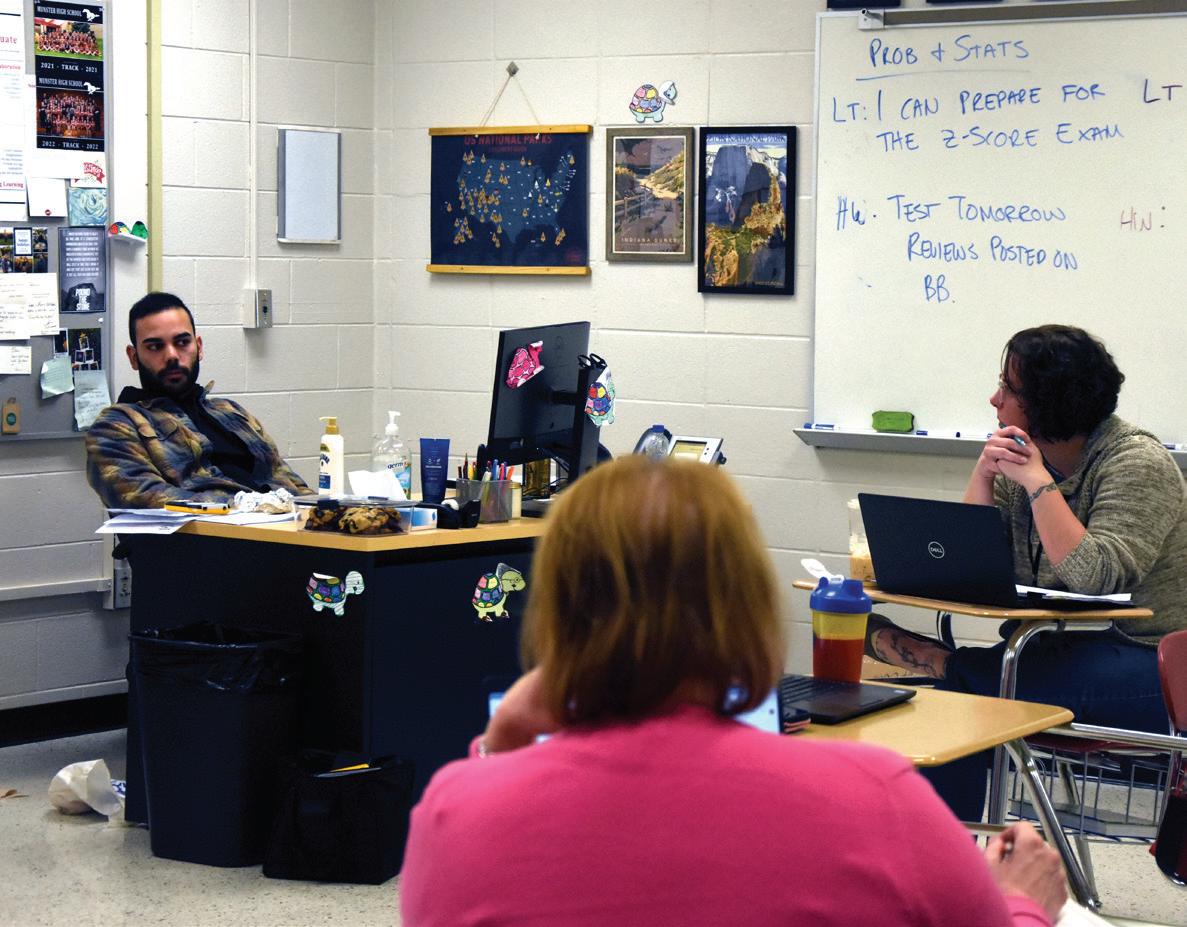
•
Thursday mornings, the faculty meets for Professional Development (PD) –topics include learning targets, student ownership, success criteria, etc
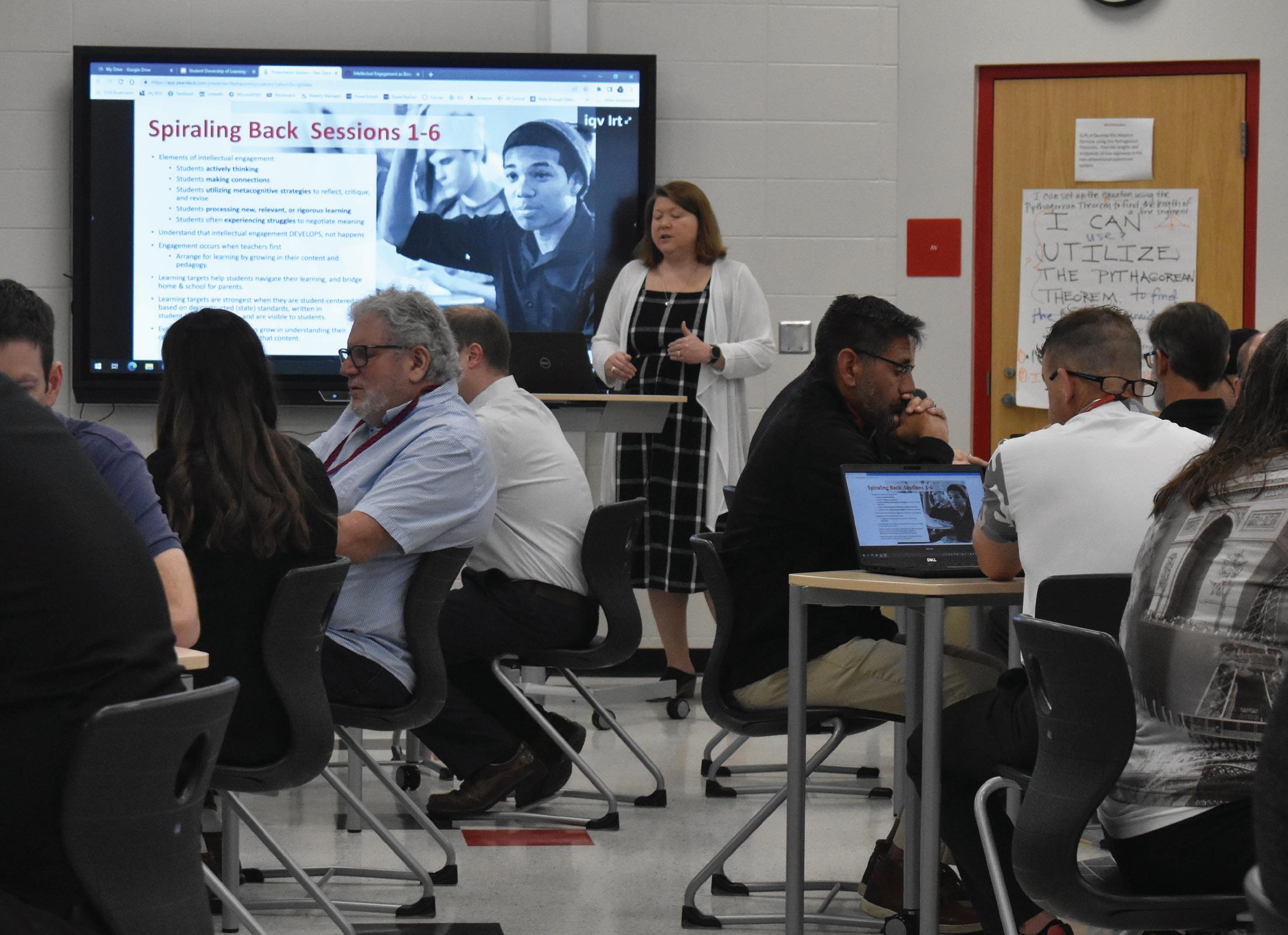
According to Mr. Nolan, four questions the
1
PLCs ask: 4 3 2

What do we want students to know and be able to do?
How do we know they are going to do it?
How do we ensure that students have mastered that content? What if they have not?
If students have mastered one concept, what about the rest?
what we want from education. friday, april 21, 2023 12
GETTING THE BALL ROLL-
ING Presenting to a crowd of teachers, Mrs. Tammy Daugherty, instructional coach, speaks to teachers about the performance of students and time management. (photo by damien salahieh)
•
In attempt to shift Munster more student-oriented, teachers reflect on how that process looks























 editor-in-chief
editor-in-chief



























